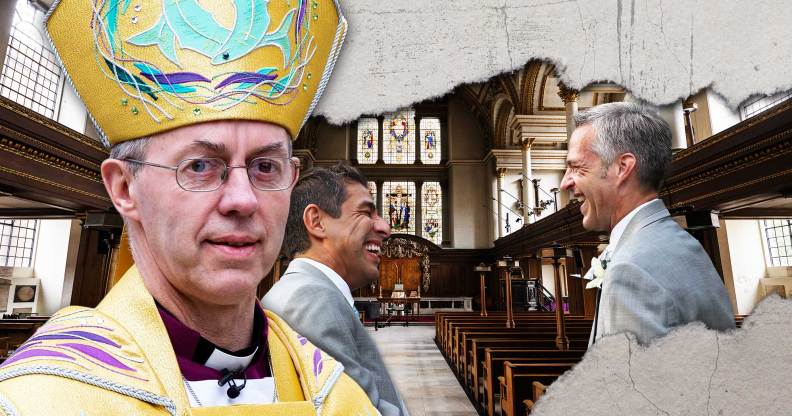Labour MP introduces bill to allow same-sex marriages in Church of England

Justin Welby, the archbishop of Canterbury (Credit: Getty Images)
Labour MP Ben Bradshaw has introduced a bill that would make it legal for Church of England clergy to conduct same-sex marriages in church.
Bradshaw has admitted his bill stands no chance of becoming law, but wants to give the church a “gentle nudge” towards accepting same-sex marriages.
The Same Sex Marriage (Church of England) Bill “would allow, in certain circumstances, priests and parishes that wish to conduct same-sex weddings to do so – a solution similar to the one governing the remarriage of divorcees or whether a parish should be forced to have a woman priest,” Bradshaw told the House of Commons on Tuesday (21 March).
The Church does not currently permit same-sex marriages, and a “quadruple lock” in UK law makes it illegal for a minister to marry same-sex couples without the governing body of their religious giving explicit consent.
The second estates commissioner Andrew Selous MP, responsible for answering questions from fellow members on matters regarding the Church of England, said marriage equality is an issue for the church.
According to Church Times, he claimed it is “just not possible to leave it to individual clergy to choose to do things that are clearly contrary to the doctrine of the Church”.
Bradshaw noted that while some opponents of the bill said it “amounts to an attack on religious freedom, or to parliament legislating on doctrine” it is, in fact, neither, and would simply undo the quadruple lock.
He explained: “The bill is deliberately drafted as permissive, so as to allow those who wish to move forward to do so in certain circumstances. Such circumstances could include prior approval by the Synod.”
National Secular Society chief executive Stephen Evans told PInkNews the bill would “clearly advance the religious freedom of Anglicans who support same-sex marriage and see no conflict between that and their faith”.
It comes more than a month after the Church of England doubled down on its ban on conducting same-sex marriages, but said it will bless the unions instead.
In February, and following a six-year consultation period, the move to offer blessings was approved by the General Synod, the Church’s governing body.
The blessings, however, are optional and members of the clergy are not obliged to offer them.
In his 10-minute speech to parliament, Bradshaw described the decision to only offer blessings as a “bitter disappointment” to LGBTQ+ Anglicans.
“The House might ask why this is a matter for MPs and for parliament,” Bradshaw continued. “Well, the Church of England is not just some sect, it is the established Church in England.
“It was established by parliament and still has its church or canon laws approved by parliament. The monarch is its supreme governor, its bishops are appointed by the monarch on the advice of the prime minister and sit in the other place [the House of Lords], it runs thousands of schools across England.
“With those privileges of establishment, comes a duty to serve the whole nation, to be there for all citizens.”
Bradshaw, who, in 2006, became the first Cabinet minister to enter into a civil partnership, added: “When the practice of the Church in how it treats its lesbian and gay members persists in being so out of step with the country as a whole, that established status is bound to be questioned.”
The MP noted the bill has “no chance of becoming law” before the end of the current parliamentary session but said its “motivation” is to “encourage the bishops to stick to the commitments and timetable agreed by February’s Synod”.
The church has a duty to serve ‘the whole nation’
On Tuesday (21 March), in a statement provided to The Church Times, a spokesperson for Church House, the Church of England’s headquarters, said: “Ben Bradshaw provided an opportunity to hear from MPs on the question of marriage law, set out in the context of the valued role the Church of England plays in the life of the nation.
“The debate will be noted and reflected on by bishops and the Synod as they continue with their work to deliver the prayers of love and faith, and pastoral principles.
“Freedom of religion and belief is an important principle championed by MPs, and, therefore, it would not be appropriate for parliament to decide the teachings of any Church or other faith group, as the second estates commissioner reminded the House in his response.
“The Church of England’s formal doctrine of marriage is a matter for the General Synod, which approved an amended motion on same-sex relationships at its most recent meeting, following an extensive national period of listening and engagement across the Church of England on questions of human identity, sexuality and marriage.”
A second reading of the bill has been set for 24 November, but as a private member’s bill will likely be bumped for government business.
How did this story make you feel?

